Trends and Challenges of Implementing 4PL in Australia
VerifiedAdded on 2023/01/19
|7
|1754
|90
AI Summary
This article discusses the trends and challenges of implementing fourth party logistics (4PL) in Australia. It explores the benefits and complexities of this logistics model, including the shift towards synchromodal logistics and the use of big data. The case study of DHL, a global logistics company, is also examined.
Contribute Materials
Your contribution can guide someone’s learning journey. Share your
documents today.

1
Supply Chain Information System
Name
Course
Date
Supply Chain Information System
Name
Course
Date
Secure Best Marks with AI Grader
Need help grading? Try our AI Grader for instant feedback on your assignments.
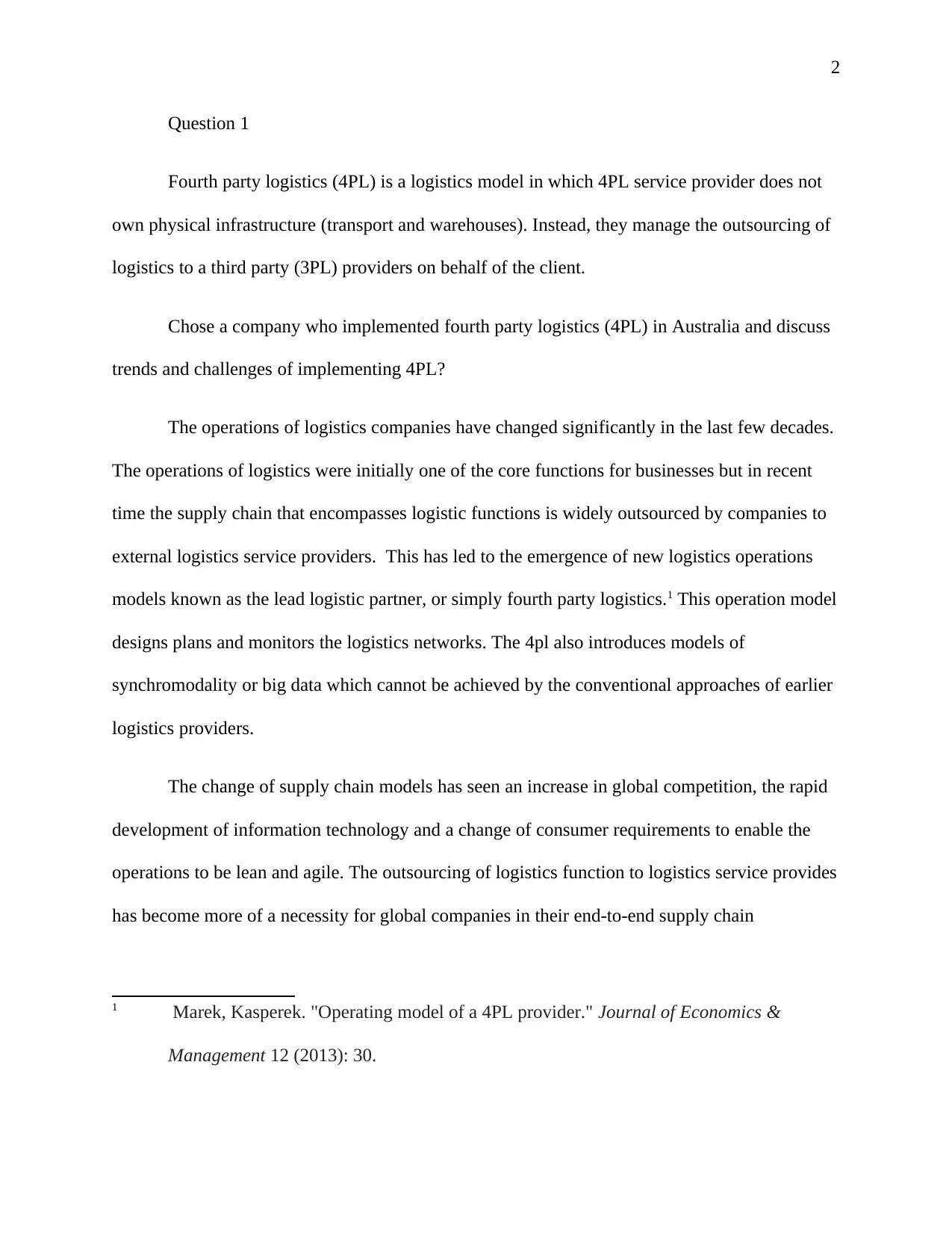
2
Question 1
Fourth party logistics (4PL) is a logistics model in which 4PL service provider does not
own physical infrastructure (transport and warehouses). Instead, they manage the outsourcing of
logistics to a third party (3PL) providers on behalf of the client.
Chose a company who implemented fourth party logistics (4PL) in Australia and discuss
trends and challenges of implementing 4PL?
The operations of logistics companies have changed significantly in the last few decades.
The operations of logistics were initially one of the core functions for businesses but in recent
time the supply chain that encompasses logistic functions is widely outsourced by companies to
external logistics service providers. This has led to the emergence of new logistics operations
models known as the lead logistic partner, or simply fourth party logistics.1 This operation model
designs plans and monitors the logistics networks. The 4pl also introduces models of
synchromodality or big data which cannot be achieved by the conventional approaches of earlier
logistics providers.
The change of supply chain models has seen an increase in global competition, the rapid
development of information technology and a change of consumer requirements to enable the
operations to be lean and agile. The outsourcing of logistics function to logistics service provides
has become more of a necessity for global companies in their end-to-end supply chain
1 Marek, Kasperek. "Operating model of a 4PL provider." Journal of Economics &
Management 12 (2013): 30.
Question 1
Fourth party logistics (4PL) is a logistics model in which 4PL service provider does not
own physical infrastructure (transport and warehouses). Instead, they manage the outsourcing of
logistics to a third party (3PL) providers on behalf of the client.
Chose a company who implemented fourth party logistics (4PL) in Australia and discuss
trends and challenges of implementing 4PL?
The operations of logistics companies have changed significantly in the last few decades.
The operations of logistics were initially one of the core functions for businesses but in recent
time the supply chain that encompasses logistic functions is widely outsourced by companies to
external logistics service providers. This has led to the emergence of new logistics operations
models known as the lead logistic partner, or simply fourth party logistics.1 This operation model
designs plans and monitors the logistics networks. The 4pl also introduces models of
synchromodality or big data which cannot be achieved by the conventional approaches of earlier
logistics providers.
The change of supply chain models has seen an increase in global competition, the rapid
development of information technology and a change of consumer requirements to enable the
operations to be lean and agile. The outsourcing of logistics function to logistics service provides
has become more of a necessity for global companies in their end-to-end supply chain
1 Marek, Kasperek. "Operating model of a 4PL provider." Journal of Economics &
Management 12 (2013): 30.
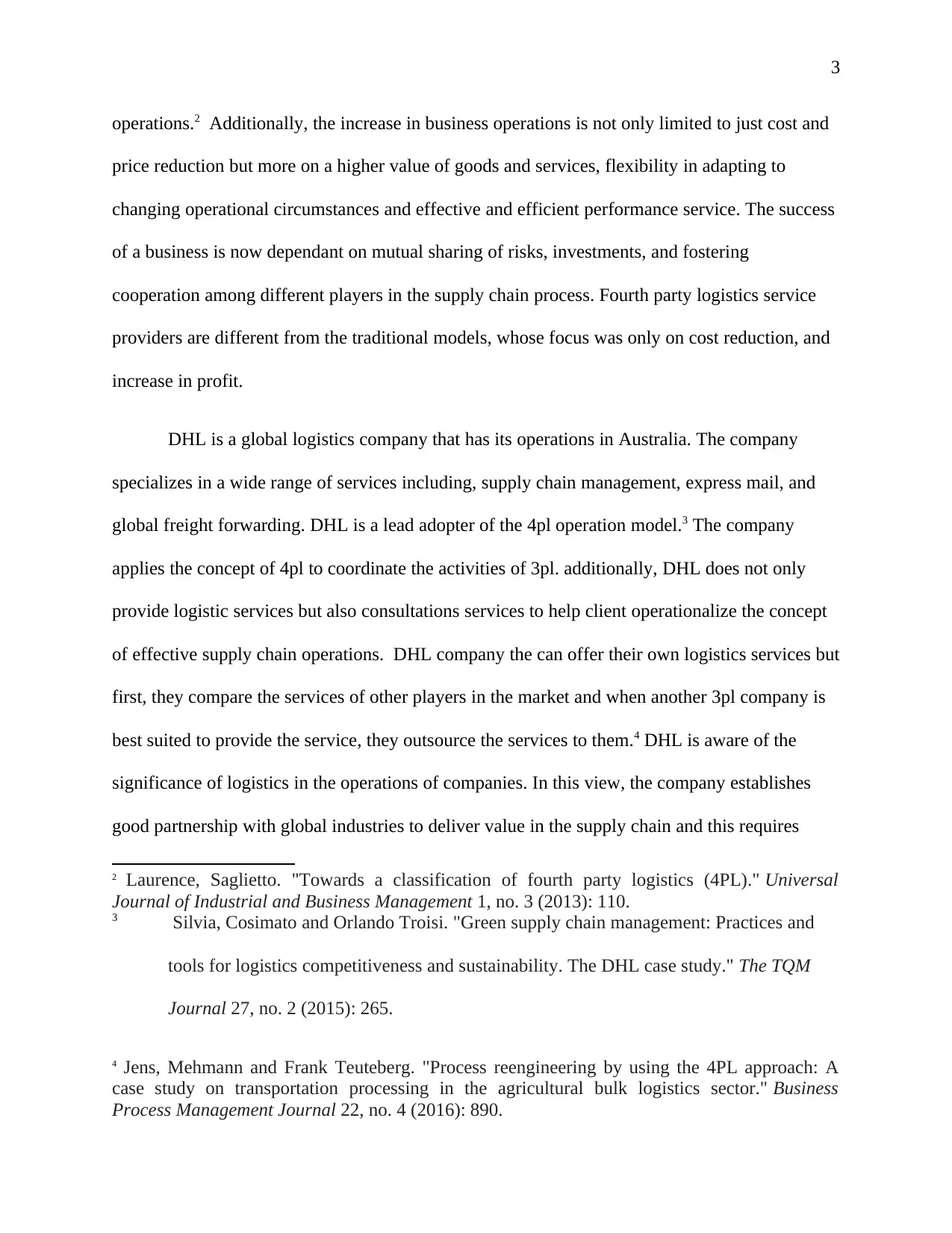
3
operations.2 Additionally, the increase in business operations is not only limited to just cost and
price reduction but more on a higher value of goods and services, flexibility in adapting to
changing operational circumstances and effective and efficient performance service. The success
of a business is now dependant on mutual sharing of risks, investments, and fostering
cooperation among different players in the supply chain process. Fourth party logistics service
providers are different from the traditional models, whose focus was only on cost reduction, and
increase in profit.
DHL is a global logistics company that has its operations in Australia. The company
specializes in a wide range of services including, supply chain management, express mail, and
global freight forwarding. DHL is a lead adopter of the 4pl operation model.3 The company
applies the concept of 4pl to coordinate the activities of 3pl. additionally, DHL does not only
provide logistic services but also consultations services to help client operationalize the concept
of effective supply chain operations. DHL company the can offer their own logistics services but
first, they compare the services of other players in the market and when another 3pl company is
best suited to provide the service, they outsource the services to them.4 DHL is aware of the
significance of logistics in the operations of companies. In this view, the company establishes
good partnership with global industries to deliver value in the supply chain and this requires
2 Laurence, Saglietto. "Towards a classification of fourth party logistics (4PL)." Universal
Journal of Industrial and Business Management 1, no. 3 (2013): 110.
3 Silvia, Cosimato and Orlando Troisi. "Green supply chain management: Practices and
tools for logistics competitiveness and sustainability. The DHL case study." The TQM
Journal 27, no. 2 (2015): 265.
4 Jens, Mehmann and Frank Teuteberg. "Process reengineering by using the 4PL approach: A
case study on transportation processing in the agricultural bulk logistics sector." Business
Process Management Journal 22, no. 4 (2016): 890.
operations.2 Additionally, the increase in business operations is not only limited to just cost and
price reduction but more on a higher value of goods and services, flexibility in adapting to
changing operational circumstances and effective and efficient performance service. The success
of a business is now dependant on mutual sharing of risks, investments, and fostering
cooperation among different players in the supply chain process. Fourth party logistics service
providers are different from the traditional models, whose focus was only on cost reduction, and
increase in profit.
DHL is a global logistics company that has its operations in Australia. The company
specializes in a wide range of services including, supply chain management, express mail, and
global freight forwarding. DHL is a lead adopter of the 4pl operation model.3 The company
applies the concept of 4pl to coordinate the activities of 3pl. additionally, DHL does not only
provide logistic services but also consultations services to help client operationalize the concept
of effective supply chain operations. DHL company the can offer their own logistics services but
first, they compare the services of other players in the market and when another 3pl company is
best suited to provide the service, they outsource the services to them.4 DHL is aware of the
significance of logistics in the operations of companies. In this view, the company establishes
good partnership with global industries to deliver value in the supply chain and this requires
2 Laurence, Saglietto. "Towards a classification of fourth party logistics (4PL)." Universal
Journal of Industrial and Business Management 1, no. 3 (2013): 110.
3 Silvia, Cosimato and Orlando Troisi. "Green supply chain management: Practices and
tools for logistics competitiveness and sustainability. The DHL case study." The TQM
Journal 27, no. 2 (2015): 265.
4 Jens, Mehmann and Frank Teuteberg. "Process reengineering by using the 4PL approach: A
case study on transportation processing in the agricultural bulk logistics sector." Business
Process Management Journal 22, no. 4 (2016): 890.
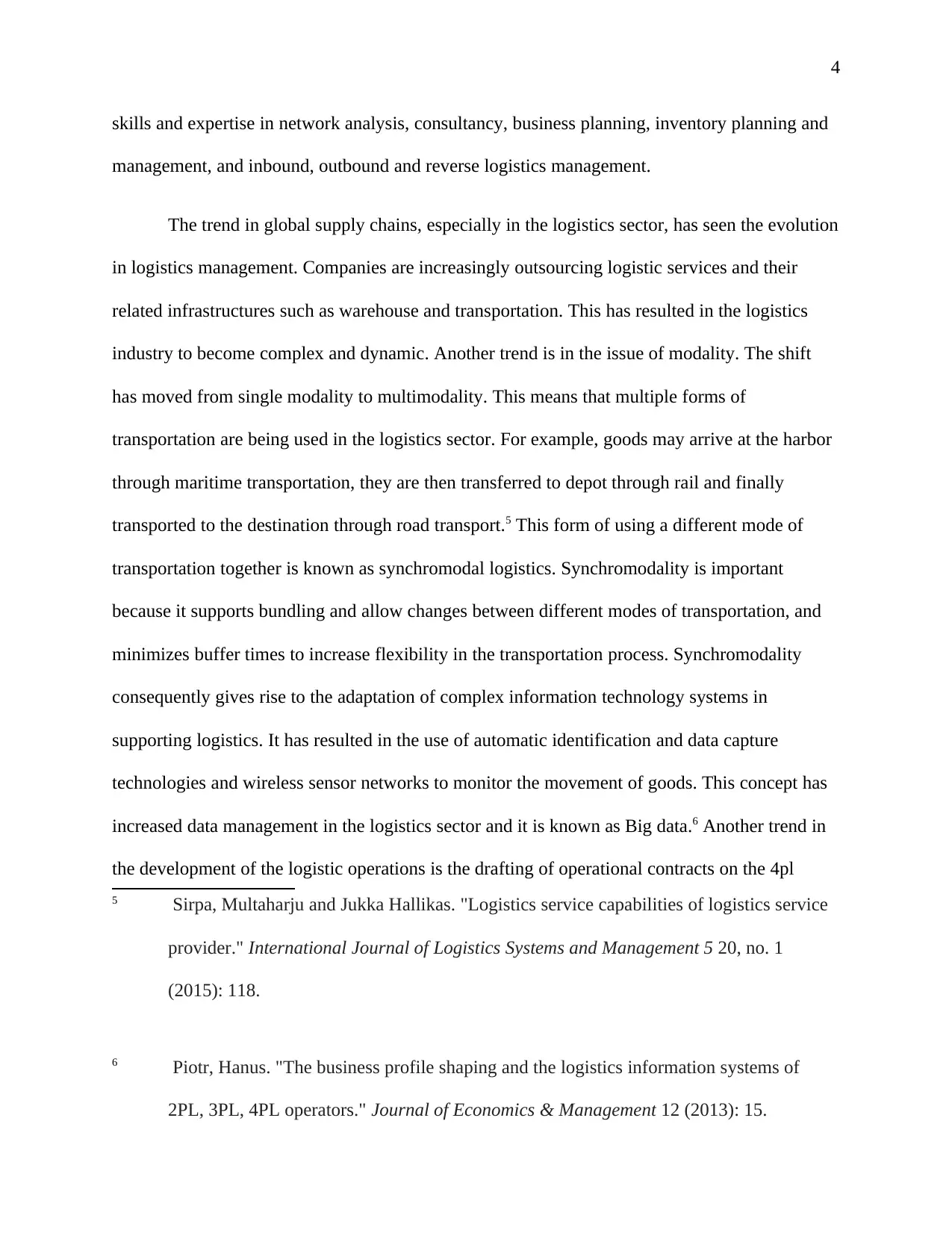
4
skills and expertise in network analysis, consultancy, business planning, inventory planning and
management, and inbound, outbound and reverse logistics management.
The trend in global supply chains, especially in the logistics sector, has seen the evolution
in logistics management. Companies are increasingly outsourcing logistic services and their
related infrastructures such as warehouse and transportation. This has resulted in the logistics
industry to become complex and dynamic. Another trend is in the issue of modality. The shift
has moved from single modality to multimodality. This means that multiple forms of
transportation are being used in the logistics sector. For example, goods may arrive at the harbor
through maritime transportation, they are then transferred to depot through rail and finally
transported to the destination through road transport.5 This form of using a different mode of
transportation together is known as synchromodal logistics. Synchromodality is important
because it supports bundling and allow changes between different modes of transportation, and
minimizes buffer times to increase flexibility in the transportation process. Synchromodality
consequently gives rise to the adaptation of complex information technology systems in
supporting logistics. It has resulted in the use of automatic identification and data capture
technologies and wireless sensor networks to monitor the movement of goods. This concept has
increased data management in the logistics sector and it is known as Big data.6 Another trend in
the development of the logistic operations is the drafting of operational contracts on the 4pl
5 Sirpa, Multaharju and Jukka Hallikas. "Logistics service capabilities of logistics service
provider." International Journal of Logistics Systems and Management 5 20, no. 1
(2015): 118.
6 Piotr, Hanus. "The business profile shaping and the logistics information systems of
2PL, 3PL, 4PL operators." Journal of Economics & Management 12 (2013): 15.
skills and expertise in network analysis, consultancy, business planning, inventory planning and
management, and inbound, outbound and reverse logistics management.
The trend in global supply chains, especially in the logistics sector, has seen the evolution
in logistics management. Companies are increasingly outsourcing logistic services and their
related infrastructures such as warehouse and transportation. This has resulted in the logistics
industry to become complex and dynamic. Another trend is in the issue of modality. The shift
has moved from single modality to multimodality. This means that multiple forms of
transportation are being used in the logistics sector. For example, goods may arrive at the harbor
through maritime transportation, they are then transferred to depot through rail and finally
transported to the destination through road transport.5 This form of using a different mode of
transportation together is known as synchromodal logistics. Synchromodality is important
because it supports bundling and allow changes between different modes of transportation, and
minimizes buffer times to increase flexibility in the transportation process. Synchromodality
consequently gives rise to the adaptation of complex information technology systems in
supporting logistics. It has resulted in the use of automatic identification and data capture
technologies and wireless sensor networks to monitor the movement of goods. This concept has
increased data management in the logistics sector and it is known as Big data.6 Another trend in
the development of the logistic operations is the drafting of operational contracts on the 4pl
5 Sirpa, Multaharju and Jukka Hallikas. "Logistics service capabilities of logistics service
provider." International Journal of Logistics Systems and Management 5 20, no. 1
(2015): 118.
6 Piotr, Hanus. "The business profile shaping and the logistics information systems of
2PL, 3PL, 4PL operators." Journal of Economics & Management 12 (2013): 15.
Secure Best Marks with AI Grader
Need help grading? Try our AI Grader for instant feedback on your assignments.
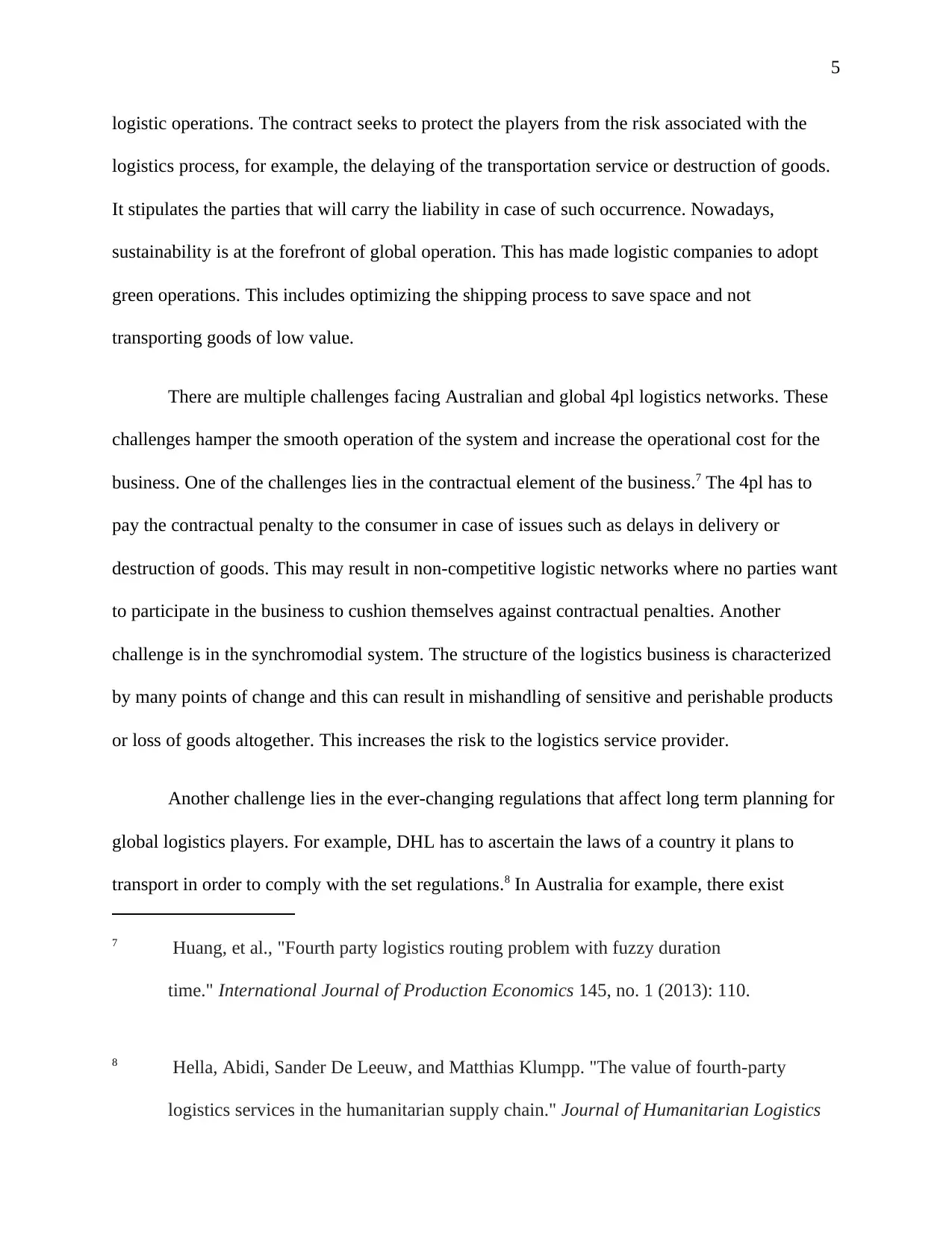
5
logistic operations. The contract seeks to protect the players from the risk associated with the
logistics process, for example, the delaying of the transportation service or destruction of goods.
It stipulates the parties that will carry the liability in case of such occurrence. Nowadays,
sustainability is at the forefront of global operation. This has made logistic companies to adopt
green operations. This includes optimizing the shipping process to save space and not
transporting goods of low value.
There are multiple challenges facing Australian and global 4pl logistics networks. These
challenges hamper the smooth operation of the system and increase the operational cost for the
business. One of the challenges lies in the contractual element of the business.7 The 4pl has to
pay the contractual penalty to the consumer in case of issues such as delays in delivery or
destruction of goods. This may result in non-competitive logistic networks where no parties want
to participate in the business to cushion themselves against contractual penalties. Another
challenge is in the synchromodial system. The structure of the logistics business is characterized
by many points of change and this can result in mishandling of sensitive and perishable products
or loss of goods altogether. This increases the risk to the logistics service provider.
Another challenge lies in the ever-changing regulations that affect long term planning for
global logistics players. For example, DHL has to ascertain the laws of a country it plans to
transport in order to comply with the set regulations.8 In Australia for example, there exist
7 Huang, et al., "Fourth party logistics routing problem with fuzzy duration
time." International Journal of Production Economics 145, no. 1 (2013): 110.
8 Hella, Abidi, Sander De Leeuw, and Matthias Klumpp. "The value of fourth-party
logistics services in the humanitarian supply chain." Journal of Humanitarian Logistics
logistic operations. The contract seeks to protect the players from the risk associated with the
logistics process, for example, the delaying of the transportation service or destruction of goods.
It stipulates the parties that will carry the liability in case of such occurrence. Nowadays,
sustainability is at the forefront of global operation. This has made logistic companies to adopt
green operations. This includes optimizing the shipping process to save space and not
transporting goods of low value.
There are multiple challenges facing Australian and global 4pl logistics networks. These
challenges hamper the smooth operation of the system and increase the operational cost for the
business. One of the challenges lies in the contractual element of the business.7 The 4pl has to
pay the contractual penalty to the consumer in case of issues such as delays in delivery or
destruction of goods. This may result in non-competitive logistic networks where no parties want
to participate in the business to cushion themselves against contractual penalties. Another
challenge is in the synchromodial system. The structure of the logistics business is characterized
by many points of change and this can result in mishandling of sensitive and perishable products
or loss of goods altogether. This increases the risk to the logistics service provider.
Another challenge lies in the ever-changing regulations that affect long term planning for
global logistics players. For example, DHL has to ascertain the laws of a country it plans to
transport in order to comply with the set regulations.8 In Australia for example, there exist
7 Huang, et al., "Fourth party logistics routing problem with fuzzy duration
time." International Journal of Production Economics 145, no. 1 (2013): 110.
8 Hella, Abidi, Sander De Leeuw, and Matthias Klumpp. "The value of fourth-party
logistics services in the humanitarian supply chain." Journal of Humanitarian Logistics
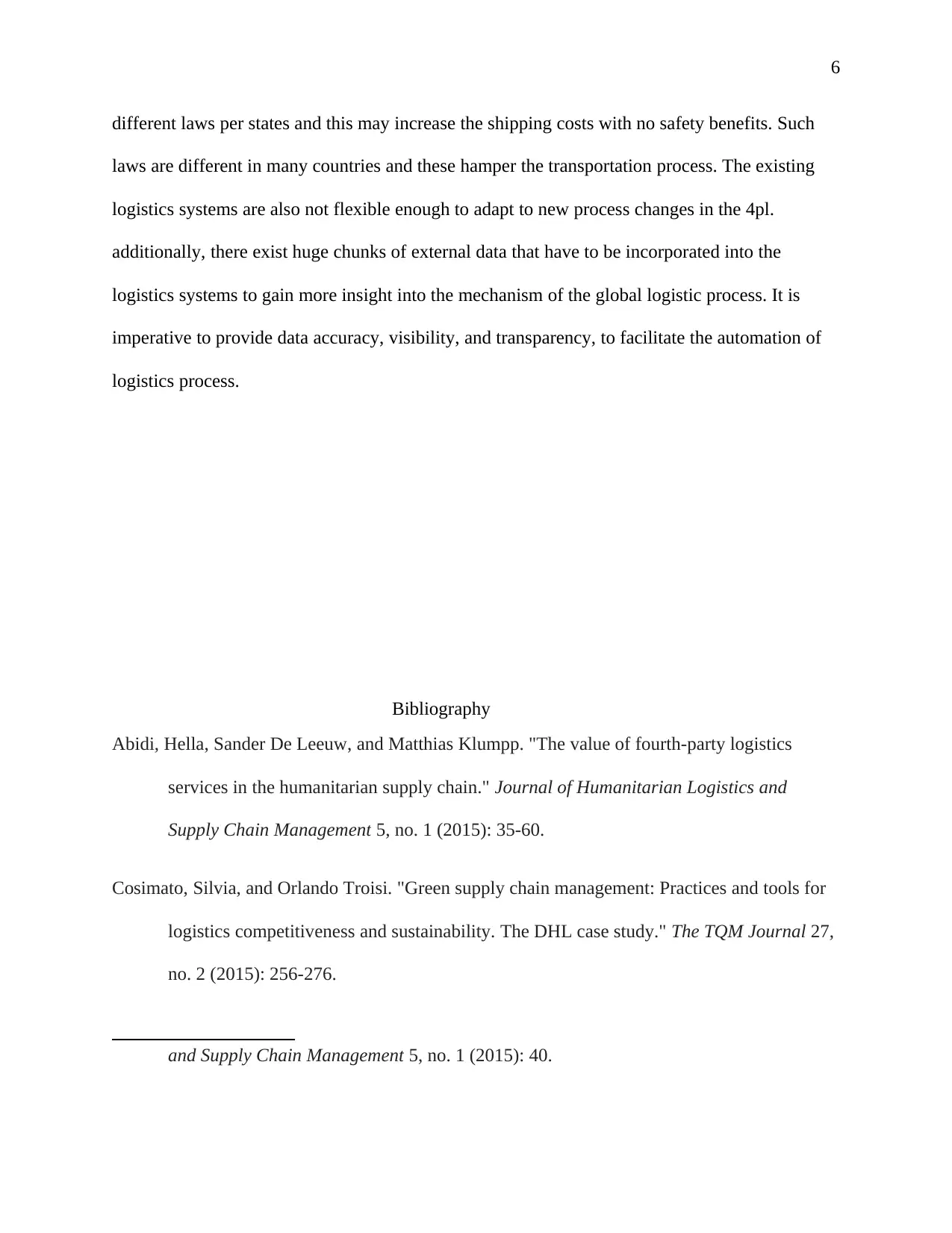
6
different laws per states and this may increase the shipping costs with no safety benefits. Such
laws are different in many countries and these hamper the transportation process. The existing
logistics systems are also not flexible enough to adapt to new process changes in the 4pl.
additionally, there exist huge chunks of external data that have to be incorporated into the
logistics systems to gain more insight into the mechanism of the global logistic process. It is
imperative to provide data accuracy, visibility, and transparency, to facilitate the automation of
logistics process.
Bibliography
Abidi, Hella, Sander De Leeuw, and Matthias Klumpp. "The value of fourth-party logistics
services in the humanitarian supply chain." Journal of Humanitarian Logistics and
Supply Chain Management 5, no. 1 (2015): 35-60.
Cosimato, Silvia, and Orlando Troisi. "Green supply chain management: Practices and tools for
logistics competitiveness and sustainability. The DHL case study." The TQM Journal 27,
no. 2 (2015): 256-276.
and Supply Chain Management 5, no. 1 (2015): 40.
different laws per states and this may increase the shipping costs with no safety benefits. Such
laws are different in many countries and these hamper the transportation process. The existing
logistics systems are also not flexible enough to adapt to new process changes in the 4pl.
additionally, there exist huge chunks of external data that have to be incorporated into the
logistics systems to gain more insight into the mechanism of the global logistic process. It is
imperative to provide data accuracy, visibility, and transparency, to facilitate the automation of
logistics process.
Bibliography
Abidi, Hella, Sander De Leeuw, and Matthias Klumpp. "The value of fourth-party logistics
services in the humanitarian supply chain." Journal of Humanitarian Logistics and
Supply Chain Management 5, no. 1 (2015): 35-60.
Cosimato, Silvia, and Orlando Troisi. "Green supply chain management: Practices and tools for
logistics competitiveness and sustainability. The DHL case study." The TQM Journal 27,
no. 2 (2015): 256-276.
and Supply Chain Management 5, no. 1 (2015): 40.
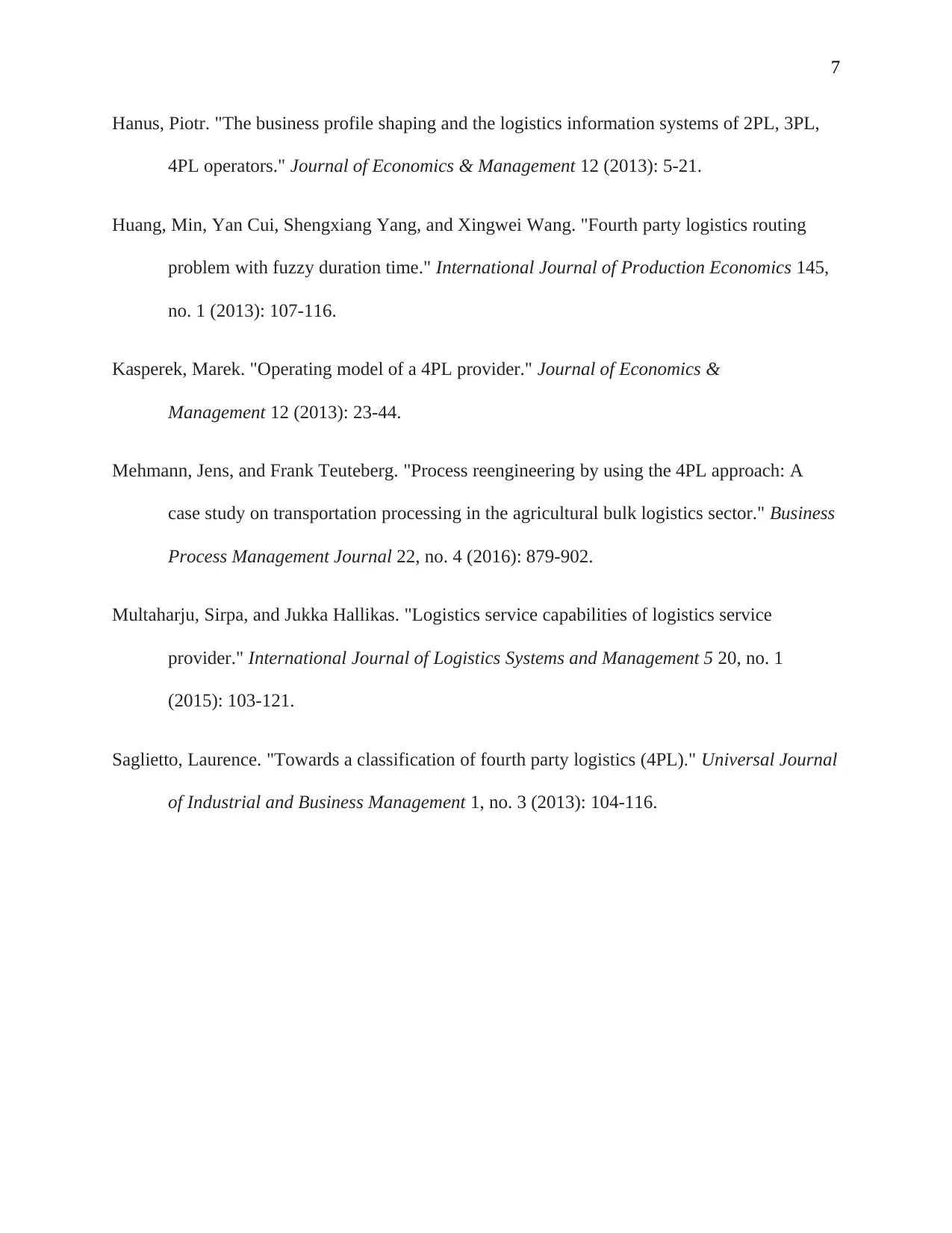
7
Hanus, Piotr. "The business profile shaping and the logistics information systems of 2PL, 3PL,
4PL operators." Journal of Economics & Management 12 (2013): 5-21.
Huang, Min, Yan Cui, Shengxiang Yang, and Xingwei Wang. "Fourth party logistics routing
problem with fuzzy duration time." International Journal of Production Economics 145,
no. 1 (2013): 107-116.
Kasperek, Marek. "Operating model of a 4PL provider." Journal of Economics &
Management 12 (2013): 23-44.
Mehmann, Jens, and Frank Teuteberg. "Process reengineering by using the 4PL approach: A
case study on transportation processing in the agricultural bulk logistics sector." Business
Process Management Journal 22, no. 4 (2016): 879-902.
Multaharju, Sirpa, and Jukka Hallikas. "Logistics service capabilities of logistics service
provider." International Journal of Logistics Systems and Management 5 20, no. 1
(2015): 103-121.
Saglietto, Laurence. "Towards a classification of fourth party logistics (4PL)." Universal Journal
of Industrial and Business Management 1, no. 3 (2013): 104-116.
Hanus, Piotr. "The business profile shaping and the logistics information systems of 2PL, 3PL,
4PL operators." Journal of Economics & Management 12 (2013): 5-21.
Huang, Min, Yan Cui, Shengxiang Yang, and Xingwei Wang. "Fourth party logistics routing
problem with fuzzy duration time." International Journal of Production Economics 145,
no. 1 (2013): 107-116.
Kasperek, Marek. "Operating model of a 4PL provider." Journal of Economics &
Management 12 (2013): 23-44.
Mehmann, Jens, and Frank Teuteberg. "Process reengineering by using the 4PL approach: A
case study on transportation processing in the agricultural bulk logistics sector." Business
Process Management Journal 22, no. 4 (2016): 879-902.
Multaharju, Sirpa, and Jukka Hallikas. "Logistics service capabilities of logistics service
provider." International Journal of Logistics Systems and Management 5 20, no. 1
(2015): 103-121.
Saglietto, Laurence. "Towards a classification of fourth party logistics (4PL)." Universal Journal
of Industrial and Business Management 1, no. 3 (2013): 104-116.
1 out of 7
Related Documents
Your All-in-One AI-Powered Toolkit for Academic Success.
+13062052269
info@desklib.com
Available 24*7 on WhatsApp / Email
![[object Object]](/_next/static/media/star-bottom.7253800d.svg)
Unlock your academic potential
© 2024 | Zucol Services PVT LTD | All rights reserved.





